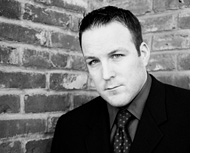
Anthony Swofford’s Gulf War memoir, Jarhead, could hardly be more timely. But the author, who served as a Marine sniper in Desert Storm, has wisely avoided virtually every nod toward direct commentary on current politics and every cliché of battlefield memoir. Instead, much of the story alternates between descriptions of Swofford’s training — his rise through the ranks and eventual deployment to Iraq — and descriptions of his personal degradation by that process. In the end, Jarhead emerges as a scary, detailed, well-written indictment of life in the military.
Swofford also offers some essential reporting. A military recruiter doesn’t offer the then-17-year-old enlistment-brochure promises — that he’ll get to see the world and defend the Constitution. More perniciously, he entices the teenager with the truth: that he’ ll spend his time getting drunk, starting fights, killing people with interesting weapons, and buying lost weekends with port-of-call prostitutes.
Swofford’s concise writing and liberal use of unquotably coarse military lingo underscore both the intensity, and ambivalence, of his experience. As he rises to a coveted spot in a prestigious sniper unit, he sucks on a bullet as a kind of pacifier and talks about wanting to kill people he meets: Bedouins encountered on a desert patrol, distant soldiers seen through a telescope.
In the end, Jarhead captures the blackest of black comedy. His Marine troop, spoiling for a fight, starts shooting at camels and firing captured weapons at burned-out Iraqi tanks. Swofford himself teeters on the edge of sanity, contemplating suicide, torturing a cohort at gunpoint, and watching his fellow soldiers desecrate Iraqi corpses. The similarity between the recruiter’s promises of a soldier’s life and the reality of Swofford’s account is instructive.















